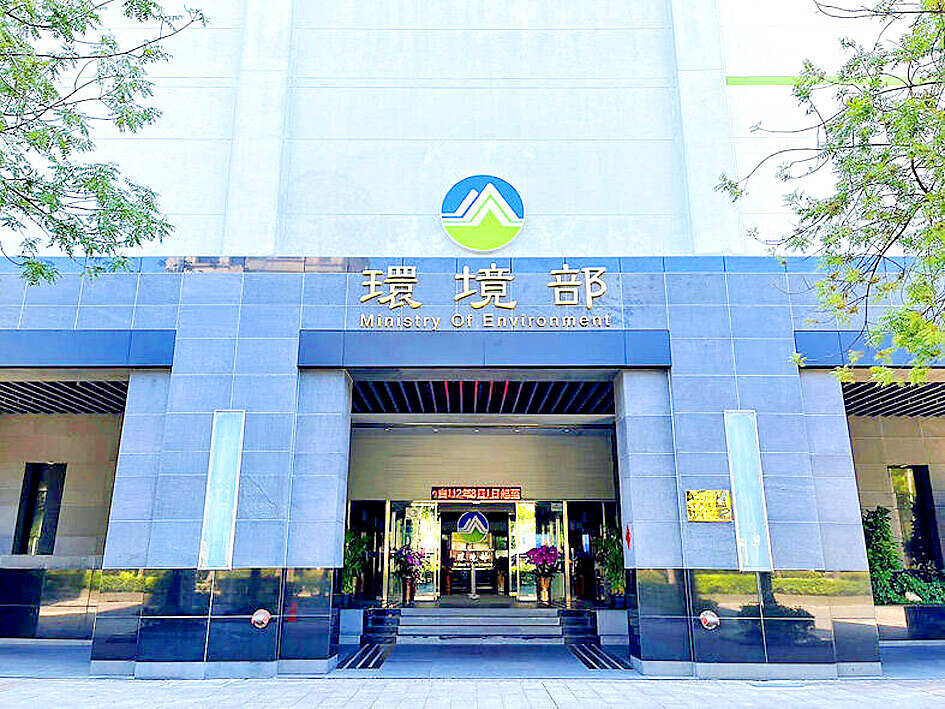The government should propose a more aggressive carbon reduction target and ensure minimal impact on workers, environmentalist groups said in a joint statement yesterday.
The Climate Change Adaptation Act (氣候變遷因應法), which came into effect on Feb. 15, 2023, states it was established to form strategies to reduce and manage greenhouse gas emissions, strengthen intergenerational justice and environmental justice, and according to Article 4 of the act, the long-term national greenhouse gas emission reduction goal is to reach net zero emissions by 2050.
To achieve that, the Ministry of Environment should implement a more aggressive reduction target for 2030, said the joint statement from Green Citizens’ Action Alliance, the Citizen of the Earth foundation, the Environmental Rights Foundation, the Taiwan Environment and Planning Association and the Homemakers’ United Foundation.

Photo: Chen Chia-yi, Taipei Times
According to the Sixth Assessment Report of the UN’s Intergovernmental Panel on Climate Change, countries should aim to reduce emissions by 43 percent by 2030 compared with 2019 levels.
Since Taiwan uses 2005 as its base year for emissions targets, its target for 2030 should be adjusted to 43.7 percent, the statement said, adding that the ministry’s current reduction goal of 28 percent by 2030 is “insufficient.”
The act does not provide the opportunity to seek redress for failing to meet reduction targets, and it “seriously infringes on individuals’ right to sue,” it said.
“The act should be revised as soon as possible to include public interest litigation clauses,” it added.
Implementation of targets was also inhibited by administrative issues, it said.
For example, the Executive Yuan’s National Council for Sustainable Development, which is legally responsible for cross-departmental coordination on sustainability goals, has long been constrained by insufficient budget and workforce, it said, adding that the council’s role was obfuscated by the establishment last year of the Presidential Office’s National Climate Change Countermeasures Committee.
“Another problem is that current policy focuses on the voluntary reduction plans of major emitters, and provides huge carbon fee discounts,” it said, adding that omissions in voluntary plans made it hard to achieve substantive supervision.
Companies’ voluntary reduction plans, with the exception of anything confidential, should be made public, it said.
“Details such as the estimated annual reduction from individual measures and the budgeted expenditures for such measures should be provided,” it added.
Plans to address climate change also needed to facilitate a “just transition” and reduce the impact on workers, it said.
Another issue is that the ministry allows small and medium-sized enterprise flexibility in how they design reduction plans, but that also results in an underestimation of emissions, it said.
Finally, vertical integration is required to improve the efficacy of promoting reduction plans at the county and municipal level, it said.
The National Council for Sustainable Development must be provided with more resources to properly coordinate and integrate policies, it added.

Alain Robert, known as the "French Spider-Man," praised Alex Honnold as exceptionally well-prepared after the US climber completed a free solo ascent of Taipei 101 yesterday. Robert said Honnold's ascent of the 508m-tall skyscraper in just more than one-and-a-half hours without using safety ropes or equipment was a remarkable achievement. "This is my life," he said in an interview conducted in French, adding that he liked the feeling of being "on the edge of danger." The 63-year-old Frenchman climbed Taipei 101 using ropes in December 2004, taking about four hours to reach the top. On a one-to-10 scale of difficulty, Robert said Taipei 101

Taiwanese and US defense groups are collaborating to introduce deployable, semi-autonomous manufacturing systems for drones and components in a boost to the nation’s supply chain resilience. Taiwan’s G-Tech Optroelectronics Corp subsidiary GTOC and the US’ Aerkomm Inc on Friday announced an agreement with fellow US-based Firestorm Lab to adopt the latter’s xCell, a technology featuring 3D printers fitted in 6.1m container units. The systems enable aerial platforms and parts to be produced in high volumes from dispersed nodes capable of rapid redeployment, to minimize the risk of enemy strikes and to meet field requirements, they said. Firestorm chief technology officer Ian Muceus said

MORE FALL: An investigation into one of Xi’s key cronies, part of a broader ‘anti-corruption’ drive, indicates that he might have a deep distrust in the military, an expert said China’s latest military purge underscores systemic risks in its shift from collective leadership to sole rule under Chinese President Xi Jinping (習近平), and could disrupt its chain of command and military capabilities, a national security official said yesterday. If decisionmaking within the Chinese Communist Party has become “irrational” under one-man rule, the Taiwan Strait and the regional situation must be approached with extreme caution, given unforeseen risks, they added. The anonymous official made the remarks as China’s Central Military Commission Vice Chairman Zhang Youxia (張又俠) and Joint Staff Department Chief of Staff Liu Zhenli (劉振立) were reportedly being investigated for suspected “serious

American climber Alex Honnold is to attempt a free climb of Taipei 101 today at 9am, with traffic closures around the skyscraper. To accommodate the climb attempt and filming, the Taipei Department of Transportation said traffic controls would be enforced around the Taipei 101 area. If weather conditions delay the climb, the restrictions would be pushed back to tomorrow. Traffic controls would be in place today from 7am to 11am around the Taipei 101 area, the department said. Songzhi Road would be fully closed in both directions between Songlian Road and Xinyi Road Sec 5, it said, adding that bidirectional traffic controls would